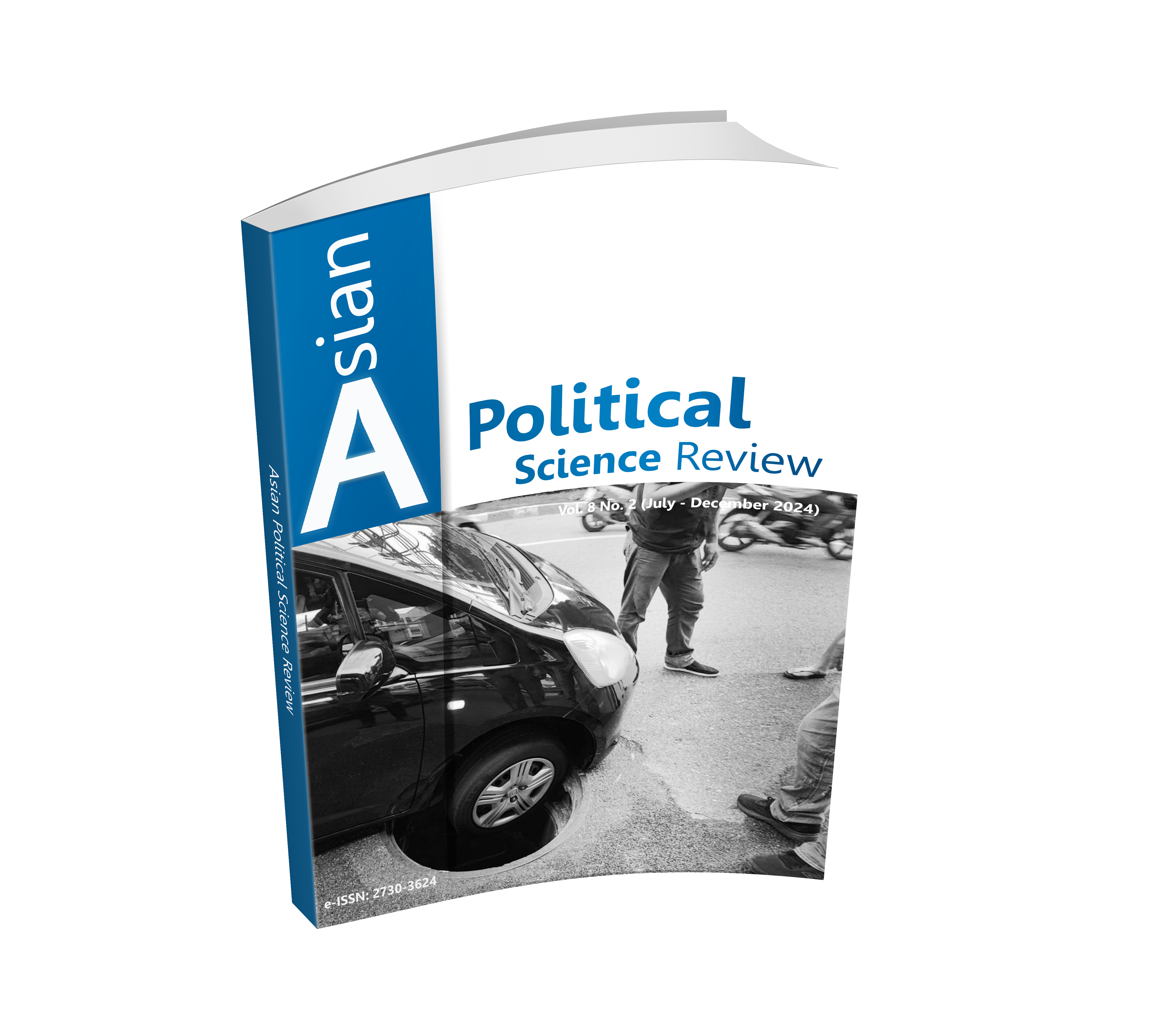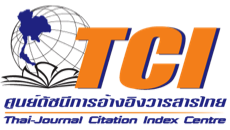THE NEXUS BETWEEN LEADERSHIP, JOB SATISFACTION, ORGANIZATIONAL CULTURE AND ORGANIZATIONAL PERFORMANCE OF PUBLIC SECTOR ORGANIZATION
DOI:
https://doi.org/10.14456/apsr.2024.18Keywords:
Leadership, Job Satisfaction, Organizational Culture, Organizational PerformanceAbstract
The main purpose of the current study is to examine the direct impact of job satisfaction and organizational culture on organizational performance. In addition to that the study has also examined the direct and mediating role of leadership styles in the relationship between job satisfaction, organizational culture and organizational performance. This investigation has added value to the works that have been done on public sector organizations generally and their leadership style, organizational culture and organizational behavior to be intended specifically. In any organization, the leaders are the ones that play a vital role in guaranteeing the success or the failure of that organization. Study contended that the finest method to effectively manage improvement is to generate it by concentrating on leadership and organizational culture. Contrary to the results of this research this presented that leadership was way more significant in improving employee satisfaction and commitment than organizational culture. Findings opposed to the fact that effective public sector management is the thing that merely and solely depends upon some degree of leadership behavior.
Downloads
References
Abuzarqa, R. (2019). The Relationship between Organizational Culture, Risk Management and Organizational Performance. Cross-Cultural Management Journal, 21(1), 13-20.
Afaq, A., Sajid, M., & Arshad, A. (2017). Examining the Impact of Servant Leadership on Teachers’job Satisfaction. Pakistan Business Review, 18(4), 1031-1047.
Akter, S., Wamba, S., & Dewan, S. (2017). Why PLS-SEM is suitable for complex modelling? An empirical illustration in big data analytics quality. Production Planning & Control, 28(11-12), 1011-1021.
Alhammadi, Y., Tham, J., & Azam, S. (2020). Leaders’ Behaviour and Situational Factors Toward Organizational Performance at Abu Dhabi National Oil Company (ADNOC). European Journal Of Human Resource Management Studies, 4(1), 118-154.
Alias, B., & Ishak, M. (2019). Integrity among Academics: Concept, Challenge and Way Forward. Creative Education, 10(12), 2760-2768.
Asghar, S., & Oino, D. (2018). Leadership styles and job satisfaction. Leadership Styles and Job Satisfaction, Market Forces, 13(1), 1-13.
Chipunza, C., & Malo, B. (2017). Organizational culture and job satisfaction among academic professionals at a South African university of technology. Problems and Perspectives in Management, 15(2), 148-161.
Choi, Y., & Ha, J. (2018). Job satisfaction and work productivity: The role of conflict-management culture. Social Behavior and Personality: An International Journal, 46(7), 1101-1110.
Dlamini, M. (2018). The impact of transformational, transactional and laissez-faire leadership styles on employee performance in Rand Water. Klerksdorp: North-West University.
Garcia, R., Sangregorio, M., & Sánchez, M. (2018). Evaluation of job satisfaction in a sample of Spanish social workers through the ‘Job Satisfaction Survey’scale. European Journal of Social Work, 21(1), 140-154.
Giddens, J. (2018). Transformational leadership: What every nursing dean should know. Journal of Professional Nursing, 34(2), 117-121.
Gurd, B., & Helliar, C. (2017). Looking for leaders:‘Balancing’innovation, risk and management control systems. The British Accounting Review, 49(1), 91-102.
Hafeez, M., Basheer, M., Rafique, M., & Siddiqui, S. (2018). Exploring the Links between TQM Practices, Business Innovativeness and Firm Performance: An Emerging Market Perspective. Pakistan Journal of Social Sciences, 38(2), 485-500.
Hair, J., Hult, G., Ringle, C., & Sarstedt, M. (2016). A Primer on Partial Least Squares Structural Equation Modeling (PLS-SEM). California: Sage Publications.
Hair, J., Matthews, L., Matthews, R., & Sarstedt, M. (2017). PLS-SEM or CB-SEM: Updated Guidelines on Which Method to Use. International Journal of Multivariate Data Analysis, 1, 107-123.
Hashmi, M., Rehman, C., & Ilyas, M. (2018). Impact of Leadership Styles on Employees’ Outcome: Mediating Role of Organizational Culture. Journal of Managerial Sciences, 12(1), 11-20.
Hatamifar, P., Darban, A., & Rezvani, M. (2018). Analyzing Quality of Supply Chain Management in Hotels of Isfahan Using the Partial Least Squares (PLS). Journal of Quality Assurance in Hospitality & Tourism, 19(2), 172-191.
Henseler, J. (2018). Partial least squares path modeling: Quo vadis?. Quality & Quantity, 52(1), 1-8.
Henseler, J., Hubona, G., & Ray, P. (2016). Using PLS path modeling in new technology research: updated guidelines. Industrial Management & Data Systems, 116(1), 2-20.
James, S., Murphy, K., & Reinhart, M. (2005). The Taxpayers' Charter: A case study in tax administration (Working Paper N.62). Australia: Centre for Tax System Integrity.
Jimenez, B. (2018). Organizational strategy and the outcomes of fiscal retrenchment in major cities in the United States. International Public Management Journal, 21(4), 589-618.
Jogaratnam, G. (2017). How organizational culture influences market orientation and business performance in the restaurant industry. Journal of Hospitality and Tourism Management, 31, 211-219.
Kawiana, I., Dewi, L., & Martini, L. (2018). The influence of organizational culture, employee satisfaction, personality, and organizational commitment towards employee performance. International Research Journal of Management, IT and Social Sciences, 5(3), 35-45.
Kebede, A., & Demeke, G. (2017). The Influence of Leadership Styles on Employees’ Job Satisfaction in Ethiopian Public Universities. Contemporary Management Research, 13(3), 165-176.
Khan, S., & Omar, N. (2018). Understanding Workplace Relationships-LMX quality, Turnover intention and employee job satisfaction, Mediating role of Superior Subordinate Communication. A paper presented at the SMMTC Postgraduate Symposium 2018, Universiti Utara Malaysia, Malaysia.
Kim, S., & Chung, E. (2019). The effect of organizational justice as perceived by occupational drivers on traffic accidents: Mediating effects of job satisfaction. Journal of Safety Research, 68, 27-32.
Koh, C., Shen, W., & Lee, T. (2016). Black-white mean differences in job satisfaction: A meta-analysis. Journal of Vocational Behavior, 94, 131-143.
Langer, J., & LeRoux, K. (2017). Developmental culture and effectiveness in nonprofit organizations. Public Performance & Management Review, 40(3), 457-479.
Madukwe, A., Njoku, E., & Dinneya, C. (2019). Occupational Stress, Transfer and Age as Predictors of Job Satisfaction among Imo Anglican Clergymen. African Journal of Social and Behavioural Sciences, 9(1), 54-69.
Mahoo, M. (2016). Assessment of utilization of client service charter in local government authorities: A case of Morogoro Municipality, Tanzania. Master of Arts Thesis, Sokoine University of Agriculture.
Marin, J., Politis, J., & Gerritsen, R. (2018). The role of middle managers in strategic change implementation in the Northern Territory Public Sector: The Australian experience. A paper presented at the 6th International Conference on Management Leadership and Governance, Bangkok University, Thailand.
Martinez, S., Sun, Y., & Gergen, E. (2018). A study of the relationship between school administrators’ leadership styles and organizational citizenship behavior. Journal of Management Science and Business Intelligence, 3(1), 1-6.
Mikkelsen, M. (2018). Do managers face a performance trade-off? Correlations between production and process performance. International Public Management Journal, 21(1), 53-73.
Mufti, M., Xiaobao, P., & Shah, S. (2020). Influence of leadership style on job satisfaction of NGO employee: The mediating role of psychological empowerment. Journal of Public Affairs, 20(1), e1983.
Naala, M., Nordin, N., & Omar, W. (2017). Innovation capability and firm performance relationship: A study of pls-structural equation modeling (Pls-Sem). International Journal of Organization & Business Excellence, 2(1), 39-50.
Nazarian, A., Soares, A., & Lottermoser, B. (2017). Inherited organizational performance? The perceptions of generation Y on the influence of leadership styles. Leadership & Organization Development Journal, 38(8), 1078-1094.
Omira, O. (2015). The effect of leadership styles and organizational culture on organizational performance of the public sector in Saudi Arabia. Doctor of Philosophy Thesis, Universiti Utara Malaysia.
Ong, M., & Puteh, F. (2017). Quantitative Data Analysis: Choosing Between SPSS, PLS, and AMOS in Social Science Research. International Interdisciplinary Journal of Scientific Research, 3(1), 14-25.
Palupi, D., Cahjono, M., & Satyawati, E. (2017). Effect of leadership on the job satisfaction with organizational commitment and trust in leader as mediators. Review of Integrative Business and Economics Research, 6(4), 400-408.
Pepe, A., Addimando, L., & Veronese, G. (2017). Measuring teacher job satisfaction: assessing invariance in the teacher job satisfaction scale (TJSS) across six countries. Europe's Journal of Psychology, 13(3), 396-416.
Puni, A., & Bosco, D. (2016). Leadership style, corporate culture and organizational performance. Research Journal of Social Science & Management, 5(10), 83-90.
Ramayah, T., Cheah, J., Chuah, F., Ting, H., & Memon, M. (2018). Partial Least Squares Structural Equation Modeling (PLS-SEM) using SmartPLS 3.0: An Updated Guide and Practical Guide to Statistical Analysis (2e). Kuala Lumpur: Pearson.
Ramhit, K. (2019). The impact of job description and career prospect on job satisfaction: A quantitative study in Mauritius. SA Journal of Human Resource Management, 17, a1092.
Raphael, T. (2019). Factors affecting implementation of Client Service Charter in Tanzania local government authorities: A case of Bagamoyo District Council. Tanzania: Mzumbe University.
Rashid, A., Bajwa, R., & Batool, I. (2016). Effect of Emotional Intelligence on Job Stress, Job Satisfaction and Organizational Commitment among Bank Employees. Pakistan Journal of Social Sciences, 36(1), 141-149.
Salehzadeh, R. (2017). Which Types of Leadership Styles Do Followers Prefer? A Decision Tree Approach. International Journal of Educational Management, 31, 865-877.
Seeger, D. (2020). Follower Perception of Leadership Communication and Leadership Style Significantly Predicting Follower Job Satisfaction Among Ohio Community College Employees. Doctor of Philosophy Thesis, Bowling Green State University.
Shafique, I., & Beh, L. (2017). Shifting organizational leadership perspectives: An overview of leadership theories. Journal of Economic & Management Perspectives, 11(4), 134-143.
Suifan, T., Diab, H., & Abdallah, A. (2017). Does organizational justice affect turnover-intention in a developing country? The mediating role of job satisfaction and organizational commitment. Journal of Management Development, 36(9), 1137-1148.
Tarcan, M., Hikmet, N., & Schooley, B. (2017). An analysis of the relationship between burnout, socio-demographic and workplace factors and job satisfaction among emergency department health professionals. Applied Nursing Research, 34, 40-47.
Verma, P., & Sharma, R. (2014). The Linkages between Business Strategies, Culture and Compensation Using Miles & Snow’s and Hofstede Culture Framework. International Journal of Business Strategy, 14(3), 111-116.
Voet, J. (2016). Change leadership and public sector organizational change: Examining the interactions of transformational leadership style and red tape. The American Review of Public Administration, 46(6), 660-682.
Wahab, S., Rahmat, A., & Yusof, M. (2016). Organization performance and leadership style: Issues in education service. Procedia-Social and Behavioral Sciences, 224, 593-598.
Xue, Y. (2019). The Influence of Organisational Culture on Leadership: A Case Study of Baidu Corporation, China. Asian Journal of Social Science Studies, 4(4), 86-106.
Yasir, M., & Mohamad, N. (2016). Ethics and Morality: Comparing Ethical Leadership with Servant, Authentic and Transformational Leadership Styles. International Review of Management and Marketing, 6(4S), 310-316.
Yuliansyah, Y., Gurd, B., & Mohamed, N. (2017). The significant of business strategy in improving organizational performance. Humanomics, 33(1), 56-74.
Zadeh, S. (2016). The Study of Role of Leadership Styles and Organizational Culture on the Financial Performance (Case Study: Mellat Bank’s Branches in the Bushehr Province). International journal of humanities and social sciences, 14, 1459-1468.
Zahra, M., Hameed, W., Fiaz, M., & Basheer, M. (2019). Information Technology Capability a Tool to Expedite Higher Organizational Performance. UCP Management Review, 3(1), 94-112.
Zirra, C., & Anyatonwu, P. (2019). Impact of Fringe Benefits on Employee Performance: A Study of Nasco Group, Jos Plateau State. International Journal of Education and Social Science, 6(1), 25-33.

Downloads
Published
How to Cite
Issue
Section
License
Copyright (c) 2024 Authors

This work is licensed under a Creative Commons Attribution-NonCommercial-NoDerivatives 4.0 International License.











.png)


